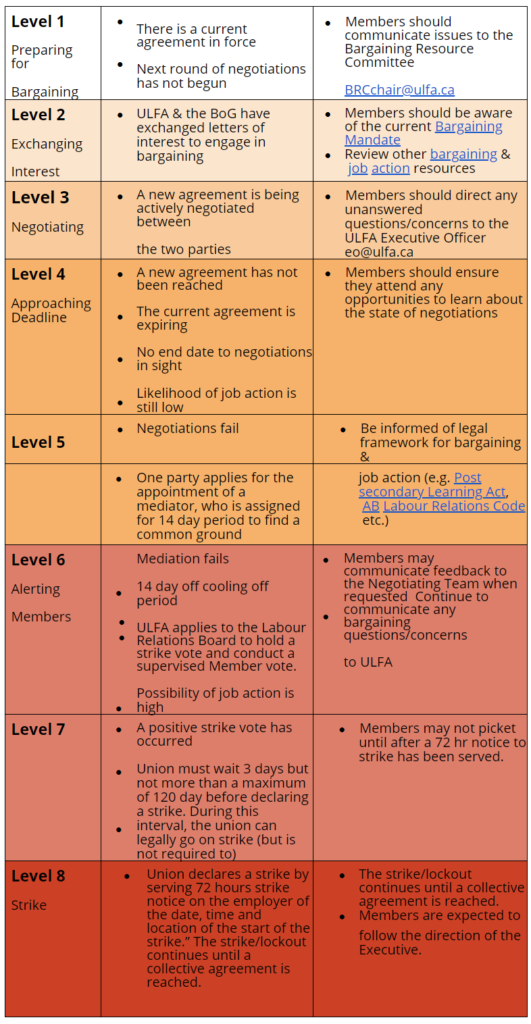
This is the first in a series of “Job Action 101” posts, the aim of which is to demystify some of the fundamental aspects of job action and address common questions about how Members can effectively prepare.
Part 1: What to Expect in the Event of a Strike or Lockout
As negotiations between ULFA and the U of L Board of Governors (the Board) continue, the ULFA Job Action Committee (JAC) is hard at work preparing in case of job action (i.e. lockout or strike). Collective bargaining remains the primary and preferred method to achieve a balanced, fair, and mutually beneficial agreement for all parties. However, in the event of strong and irreconcilable disagreement between ULFA and the Board, implementation of unified strike action of the ULFA Membership represents a vital and sometimes necessary mechanism to gain traction on key issues affecting the Membership, students and in effect, the entire University Community.
This is the first in a series of “Job Action 101” posts, the aim of which is to demystify some of the fundamental aspects of job action and address common questions about how Members can effectively prepare.
What is Job Action?

“Job action” is a powerful tool used by an employer and/or an employee union in order to resolve otherwise insoluble disagreements between the parties during collective bargaining. In effect, job action can take the form of:
- Lockout – when the employer locks out employees
- Strike – when the union withdraws labour from the employer.

Lockouts and strikes are governed by the terms of the Alberta Labour Relations Code. For example, a strike cannot occur until an application for a strike vote has been made the Alberta Labour Relations Board. If the ALRB allows the application, then there also must be a positive strike vote by union (ULFA) members. NOTE: a majority strike vote does not mean that a union will go on strike, only that the members have empowered the Executive to do so if a compromise with the employer cannot be achieved. The decision to vote in favour of a strike is a very significant decision and it is important that your vote reflects your true views. However, it is very commonly the case that a credible threat of a strike is enough to bring the two sides back to meaningful negotiations. In the post-secondary sector there are several times more strike votes than actual strikes.
What is expected of me during a strike?

During a strike, we withdraw our labour and participate in job action duties (such as participating in pickets, volunteering in the headquarters, coordinating volunteers and resources, etc.). Labour includes, but is not limited to, the following:
- Teaching, supervising, and advising students
- Sending/receiving employment-related email, including to students
- Library work, including collections, copyright, teaching, and research assistance
- Service to the university and/or university-related community work
- Administrative duties

There are alternative ways to engage in labour action, including “work-to-rule”, refusing to work overtime or other volunteer work, etc. Depending on the circumstances, these options may be considered in advance of a full labour withdrawal. Our members can also make displays of solidarity in advance of a strike, such as information gatherings, displaying images, wearing buttons, etc.
All academic staff have the right to participate in job action (strike), unless you are required to remain at work by the terms of the Essential Services Agreement (ESA). Upon the passing of a vote to strike, the ULFA Job Action Committee will organize with members to form picket and other information campaigns with individual duties assigned to members by the ULFA Job Action Committee to support the cause.
A strike only starts on the date and time and at the location set out in the Strike Notice given by ULFA to the Employer. It is unlawful for members to begin strike activity in advance.
What is our current situation regarding negotiations and a possible strike vote?
The progression towards a possible strike is outlined in the following table, which is based on the Canadian Association of University Teachers’ (CAUT) job action preparedness model. Under this framework we are currently between Levels 3 and 4 as our current agreement is now past due, and there remain a number of key issues that are still under negotiation. The possibility of a strike vote is still low but the ULFA Executive will continue to provide updates to the Membership regarding negotiation progression.


